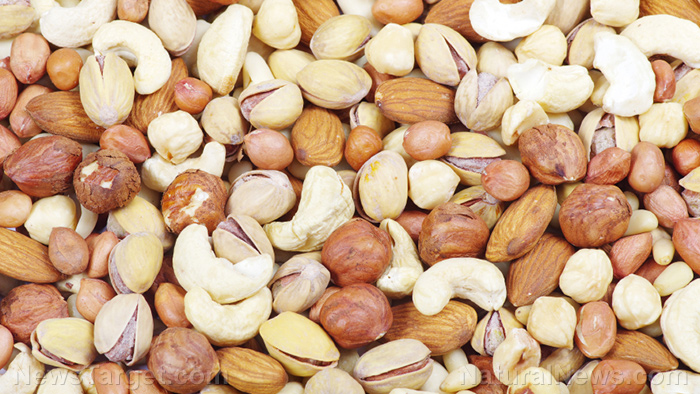A good diet can help eliminate bipolar disorder symptoms – review
10/29/2019 / By Evangelyn Rodriguez

Bipolar disorder is a brain disorder that causes unpredictable fluctuations in the mood, energy, and activity levels of affected individuals. Also known as manic-depressive illness, bipolar disorder is characterized by mood swings that include emotional highs (manic episodes) and lows (depressive episodes).
Numerous studies suggest that diet plays an important role in the prevention and treatment of various diseases. However, the specific effects of diet on mental health are still unknown. In an article published in The Journal of Alternative and Complementary Medicine, researchers from Murdoch University and Deakin University in Australia wrote a narrative review of previous studies on the influence of diet on bipolar disorder. They reported that, although research is limited, preliminary findings hint of a relationship between diet and bipolar disorder.
How diet influences bipolar disorder
Cross-sectional studies show that people with bipolar disorder follow an unhealthy diet. This has significant implications as bipolar disorder has a high comorbidity with several diseases. According to literature, diet influences several biological processes that are dysregulated in bipolar patients. These processes include:
- Monoaminergic activity, which involves the monoamine neurotransmitters dopamine, epinephrine, histamine, norepinephrine, and serotonin.
- Immune processes like inflammation, which can become chronic and cause serious health problems, such as diabetes, heart disease, and cancer.
- Oxidative stress, which results from an imbalance between antioxidants and free radicals and can be damaging to cells.
- Mitochondrial activity, which refers to the body’s natural process of producing energy for cell metabolism.
- Neuroprogression, or the changes in clinical manifestations, biochemical markers, and cerebral structures observed in patients with mental health conditions.
A recent study also revealed that weight and diet can affect the effectiveness of bipolar treatments. While a healthy diet consisting of fruits and vegetables helps improve depression, a poor diet full of saturated fats and refined carbohydrates promotes inflammation. This immune response, in turn, aggravates bipolar symptoms.
Because of the implications of these findings, the researchers believe that the role of diet in bipolar disorder needs to be extensively studied to better improve treatment options.
Healthy foods that help manage bipolar disorder
As with serious conditions like diabetes and heart disease, bipolar disorder can be managed by following a proper diet and combining it with regular exercise and healthy lifestyle changes. Certain foods are rich in nutrients that can help enhance a person’s mood and improve mental health. If you’re living with bipolar disorder, here are some great superfoods to incorportate into your diet:
- Avocado — This superfruit is known for its abundance in healthy fats. Research suggests that the “good” monounsaturated fat in avocado enhances the sensitivity of receptors in the brain to serotonin, the key hormone that stabilizes mood. Avocado fats also help lower cholesterol and blood pressure, which can help people feel more relaxed.
- Beans — Increased homocysteine in the blood caused by vitamin B9 (folate) deficiency is linked to depression and functional deterioration in bipolar patients. To keep blood levels of this amino acid normal, experts recommend eating foods rich in folate, such as chickpeas, mung beans, and pinto beans.
- Brazil nuts — Micronutrient deficiency, in particular magnesium, selenium, and zinc deficiencies, is associated with depression. Bipolar patients will therefore benefit from eating Brazil nuts, which are excellent sources of these three mood-enhancing minerals. Brazil nuts also contain B vitamins, which can help with circulation problems, anxiety, irritability, and other bipolar symptoms.
- Chocolate — Dark chocolate is well-known for its ability to lift the mood and control mood swings. This superfood not only stimulates the production of feel-good hormones called endorphins, it also supplies serotonin, a natural antidepressant that helps elevate the mood.
- Dark leafy greens — Vegetables like collards, spinach, and turnip greens are abundant in folate, which can help control mood swings. A review of existing literature even mentions the importance of folate supplementation in depressed patients as it can also augment the effects of antidepressants.
- Fruits — Bananas, mangoes, and pineapples are great sources of vitamin B6, which is used by the body to produce mood-influencing hormones like norepinephrine. Norepinephrine can boost brain performance and improves a person’s mood and focus. Meanwhile, low levels of norepinephrine can cause depression and other mental disorders.
- Salmon — Besides vitamin B6, the body also needs tyrosine to produce norepinephrine and another mood-stabilizing hormone called dopamine. Tyrosine is an amino acid found in protein-rich foods, such as meats, eggs, and fish. Salmon, in particular, has the advantage of being a great source of tyrosine as well as of omega-3 fatty acids, which, according to studies, can help with depression.
- Walnuts — Walnuts are the healthiest nuts in the world. They also contain all the right nutrients to help bipolar patients manage their condition. These nutrients include folate, omega-3 fatty acids, and vitamins B6 and E. According to a recent study, regular consumption of walnuts can reduce the risk of depression and improve the mood.
Eating healthily benefits not just your physical health, but also your mental health and well-being. Adopt an anti-inflammatory diet rich in fruits and vegetables and avoid processed foods and saturated fats to manage bipolar disorder.
You can find other food sources of mood-stabilizing nutrients at Nutrients.news.
Sources include:
Tagged Under: Anti-inflammatory foods, beatdepression, bipolar disorder, brain function, brain health, clean food, comorbidity, depression, diet, fruits, functional food, healthy fats, immune system, inflammation, mental health, nervous system, omega-3 fatty acids, organics, oxidative stress, research, science, vegetables
RECENT NEWS & ARTICLES
BrainFunction.News is a fact-based public education website published by Brain Function News Features, LLC.
All content copyright © 2018 by Brain Function News Features, LLC.
Contact Us with Tips or Corrections
All trademarks, registered trademarks and servicemarks mentioned on this site are the property of their respective owners.



















